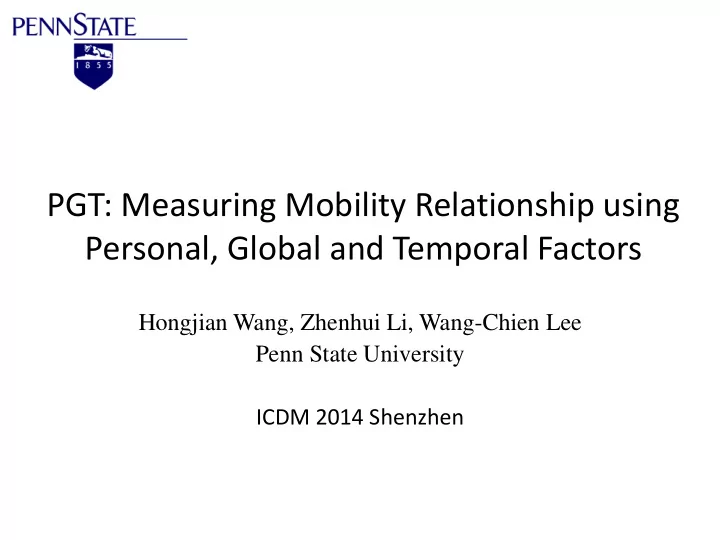

PGT: Measuring Mobility Relationship using Personal, Global and Temporal Factors Hongjian Wang, Zhenhui Li, Wang-Chien Lee Penn State University ICDM 2014 Shenzhen
Measure the mobility relationship strength • Given trajectories of two users, measure their relationship strength ID Location Time-stamp R 40.812, -77.856 2014-11-22 13:00:00 R 40.770, -77.855 2014-11-22 13:30:40 R 40.774, -73.975 2014-12-27 10:00:00 … … … • Application – Recommendation – Crime investigation Measuring Mobility Relationship 2 Hongjian Wang, Penn State University
Baseline Method -- Meeting Frequency the more frequently you co-locate with another person, less frequently the stronger the mobility relationship is. weaker Measuring Mobility Relationship 3 Hongjian Wang, Penn State University
Measuring Mobility Relationship 4 Hongjian Wang, Penn State University
Personal Background is important Shanghai has a lower probability to be visited. Co-location in Shanghai is less likely, but it happens. Co-location event in Shanghai should carry higher weight. Measuring Mobility Relationship 5 Hongjian Wang, Penn State University
Personal Background Formulation • For given user 𝑗 , the probability of visiting location 𝑚𝑝𝑑 𝑙 is 𝑗 𝑒𝑗𝑡𝑢 𝑚𝑝𝑑 𝑙 ,𝑚𝑝𝑑 𝑙 −𝑑⋅ 𝑇 𝑗 𝜍 𝑗, 𝑚𝑝𝑑 𝑙 = 𝑓 𝑗 ∈𝑇 𝑗 𝑚𝑝𝑑 𝑟 The visited location is far from Judge whether visited others, the probability is low. location is close to others. Measuring Mobility Relationship 6 Hongjian Wang, Penn State University
Measuring Mobility Relationship 7 Hongjian Wang, Penn State University
Global Background Matters • A and B meet in downtown for 10 times. • C and D meet in D’s house for 10 times. Relationship(A,B) = Relationship(C,D) Measuring Mobility Relationship 8 Hongjian Wang, Penn State University
Global Background Formulation 𝑇 𝑗 𝑚𝑝𝑑 𝑙 𝑄 𝑗, 𝑚𝑝𝑑 𝑙 = |𝑇 𝑗 𝑚𝑝𝑑 𝑙 | 𝑗 At loc k , the probability of observing different use i . 𝑚𝑝𝑑 𝑙 = − 𝑄 𝑗, 𝑚𝑝𝑑 𝑙 ⋅ log 𝑄(𝑗, 𝑚𝑝𝑑 𝑙 ) 𝑗:𝑄 𝑗,𝑚𝑝𝑑 𝑙 ≠0 Entropy of loc k . Less users visited -> lower entropy -> more private location Measuring Mobility Relationship 9 Hongjian Wang, Penn State University
Measuring Mobility Relationship 10 Hongjian Wang, Penn State University
Temporal Correlation Between Events 03-26 10:00 03-26 11:20 03-26 14:30 03-26 15:36 03-26 15:37 Continuous meeting events probably one-time trip? 03-01 10:00 04-23 09:20 05-01 11:30 06-21 10:46 06-26 08:37 Sporadic meeting events a stronger relationship indication Measuring Mobility Relationship 11 Hongjian Wang, Penn State University
Related Work • Co-location frequency as measure (without considering background): – Kalnis et al. SSTD, 2005 – Jeung et al. VLDB, 2008 – Li et al. VLDB, 2010 – Cranshaw et al. Ubicomp, 2010 . – Zheng et al. ICDE, 2013 • Global factors: Pham et al. SIGMOD, 2013 . • Personal factors: None • Temporal factors: None Measuring Mobility Relationship 12 Hongjian Wang, Penn State University
Experiments • Datasets – two location-based social networks check-in data* – Gowalla (Feb, 2009 – Oct, 2010) – Brightkite (Apr, 2008 – Oct, 2010) * E. Cho, S. A. Myers, and J. Leskovec , “Friendship and mobility: user movement in location- based social networks,” in Proc. KDD, 2011. Measuring Mobility Relationship 13 Hongjian Wang, Penn State University
Experiments: Compare with the State of the Art on Gowalla Measuring Mobility Relationship 14 Hongjian Wang, Penn State University
Experiments: Compare Various Factors The precision-recall curves on top 5000 users from Gowalla. Measuring Mobility Relationship 15 Hongjian Wang, Penn State University
Case Study: Personal Factor works Both pairs meet 5 times in total. Blue Pair are friends. Green not. Measuring Mobility Relationship 16 Hongjian Wang, Penn State University
Personal Profile of the Four Users Friend Not Measuring Mobility Relationship 17 Hongjian Wang, Penn State University
Results using Different Measures User Pair Friends / Not Frequency Personal Factor #267, #510 Yes 5 22.03 #350, #6138 No 5 9.72 First Pair is more likely to be friends. Measuring Mobility Relationship 18 Hongjian Wang, Penn State University
Summary • We propose a unified framework to measure the strength of relationship based on two users’ mobility. • Our model is simple and deterministic, which considers: – Personal probability visiting a location – Location popularity from general public – Temporal correlation among co-locations Measuring Mobility Relationship 19 Hongjian Wang, Penn State University
Future work • Extend this work from identifying pairwise relationships to discovering common interest groups. • Further combine the context at each location, such as the activity at that location. Measuring Mobility Relationship 20 Hongjian Wang, Penn State University
Measuring Mobility Relationship 21 Hongjian Wang, Penn State University
Dataset Properties • The Gowalla users tend to check-in at featured spots, and recommend places and trips for others. • The Brightkite users tend to check-in with acquaintance to maintain personal social circle. • As a result, check-ins in Gowalla are mostly made on popular places. Measuring Mobility Relationship 22 Hongjian Wang, Penn State University
Datasets Have Different Properties The distribution of time gaps between consecutive meeting events for three representative groups (meeting frequency = 2; 5; 10). Measuring Mobility Relationship 23 Hongjian Wang, Penn State University
Social Relation From Geospatial Data • Diversity of co-locations High diversity -> high probability of friendship H. Pham, C. Shahabi , and Y. Liu, “ Ebm: An entropy-based model to infer social strength from spatiotemporal data,” in Proc. SIGMOD, 2013. Measuring Mobility Relationship 24 Hongjian Wang, Penn State University
Recommend
More recommend